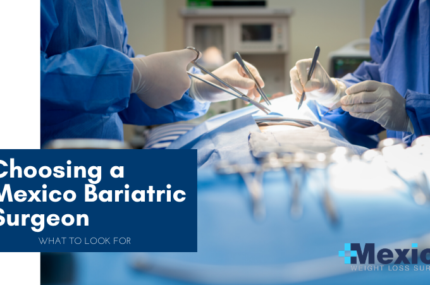Exploring Your Options: The Types of Surgery in Mexico for Weight Loss

Knowing you want a change is one thing.
Knowing how to go about it is another.
When it comes to weight loss surgery, both of these statements ring true.
key takeaways
Mexico offers a comprehensive range of weight loss surgeries that cater to diverse patient needs and conditions.
Each surgery type comes with specific benefits and is suited for different candidates based on their needs.
The combination of experienced surgeons, cost-effectiveness, and state-of-the-art facilities makes Mexico an attractive destination for weight loss surgery.
Deciding to undergo weight loss surgery is a big decision that few people enter into lightly.
But deciding what type of weight loss surgery to have is an even bigger one.
With a variety of options on the market today, how do you determine which surgery is best?
How do you know which surgery is going to give you the long term results you’re looking for?
Let’s start by breaking down your options and helping you understand each weight loss procedure, and which one may be the right one for you.
What is Bariatric Surgery and Why Is It So Popular?

Bariatric surgery, often referred to as weight loss surgery, comprises various procedures performed on the stomach or intestines to help with weight loss…particularly when other methods — like diet and exercise — have been tried but have not been successful on their own.
This type of surgical intervention is a significant and life-changing decision for individuals struggling with obesity and its related health conditions.
Its popularity has surged over the years due to its effectiveness in achieving substantial and lasting weight loss.
The Beginnings of Bariatric Surgery
The origins of bariatric surgery can be traced back to the 1950s and 1960s, with the first procedures being more experimental and aimed at treating severe obesity.

Early forms of bariatric surgery were quite invasive and primarily focused on bypassing large portions of the stomach and small intestine.
Over the decades, however, bariatric surgeries have evolved significantly, with advancements in medical technology and surgical techniques now leading to safer, more effective, and less invasive options.
In the 1970s and 1980s, the development of procedures like the Roux-en-Y gastric bypass set a new standard for bariatric surgery, offering better outcomes for patients. The introduction of laparoscopic techniques in the 1990s represented a major leap forward, reducing the risks associated with open surgery and leading to quicker recovery times for patients — a huge plus and welcome development.
The Increasing Popularity of Bariatric Surgery
Bariatric surgery’s popularity is primarily due to its effectiveness in achieving significant weight loss when traditional methods such as diet, exercise, and medication have not yielded results.
Here are some key factors that contribute to this:
Reliability of Results: Unlike other weight loss methods, bariatric surgery offers a more permanent solution to obesity.
With lifestyle adjustments, the weight loss achieved can be maintained long-term, making it a compelling option for those struggling with chronic obesity.
Accessibility and Support: The growing acceptance of bariatric surgery within the medical community, coupled with more inclusive insurance coverage, has made these procedures more accessible to a wider population.
Not only that, but the proliferation of support groups and educational resources has helped demystify the process and provided a supportive community for those considering or undergoing surgery.
Advancements in Surgical Techniques: Ongoing advancements in surgical techniques and the development of less invasive procedures, such as the laparoscopic sleeve gastrectomy, have made bariatric surgery safer and more appealing.
These improvements have significantly reduced the risks and increased the success rates of these surgeries, leading to better outcomes, more effective long term results, and happier bariatric patients.
Let’s take a look at some of the most common and effective weight loss procedures that are being performed today.
Mexico Bariatric Experts
Uncover the Renew Bariatrics Difference with Mexico Bariatric Experts – Your personalized journey to transformative well-being.
Gastric Sleeve Surgery
Gastric Sleeve Surgery, or sleeve gastrectomy, is a transformative bariatric procedure designed for significant weight loss.
During this surgery, about 80% of the stomach will be surgically removed, leaving a narrow tube or “sleeve” which becomes the new, much smaller stomach.
This reduction limits the amount of food one can eat before feeling full, leading to substantial weight loss over time.

Unlike other weight loss surgeries, it does not alter the digestive tract, which means that while the stomach size is drastically reduced, the process of digestion remains unchanged.
Benefits
The benefits of undergoing Gastric Sleeve Surgery are manifold. Not only does it facilitate significant weight loss by physically restricting food intake, but patients often report a decrease in appetite and cravings as well.
Gastric Sleeve Surgery also tends to be a simpler procedure compared to other bariatric surgeries.
This simplicity can lead to a shorter hospital stay and quicker recovery time, along with a lower risk of complications that may be seen with other types of bariatric procedures.
Ideal Candidates
Gastric Sleeve Surgery is best suited for individuals with a Body Mass Index (BMI) of 30 or higher, who have struggled to lose weight through traditional methods such as diet and exercise.
It’s an especially good option for those who might not be candidates for more complex bariatric procedures due to certain health issues.
The success of this type of laparoscopic surgery not only depends on the operation itself but also on the patient’s commitment to maintaining a healthy lifestyle post-surgery, including adhering to a balanced diet and regular physical activity.
It will be crucial for any potential candidate to have a realistic expectation of what they hope to gain from the surgery, and to understand both the benefits and the risks involved with the procedure.
Gastric Bypass Surgery
Gastric Bypass Surgery, formally known as Roux-en-Y Gastric Bypass, is a bariatric procedure that combines two weight loss strategies: restriction and malabsorption.

In the first part of the procedure, the surgeon creates a small pouch at the top of the stomach, significantly reducing its size and thus limiting the amount of food it can hold.
The second part of the procedure involves connecting a part of the small intestine to this newly created pouch, bypassing a large portion of the small intestine. This bypass reduces the body’s capacity to absorb calories and nutrients from the food, aiding in weight loss.
Benefits
The benefits of Gastric Bypass Surgery are twofold. Patients typically experience rapid and significant weight loss within the first 6 to 12 months post-surgery and the surgery has been shown to have profound effects on obesity-related health conditions.
Many patients see improvements in or the resolution of type 2 diabetes, hypertension, sleep apnea, and high cholesterol. This improvement in comorbid conditions can greatly reduce the risk of cardiovascular diseases and improve the overall quality of life.
Ideal Candidates
Gastric Bypass Surgery is particularly suitable for individuals with a higher Body Mass Index (BMI), generally those with a BMI of 40 or above, or those with a BMI of 35 or above who also suffer from serious obesity-related health conditions, such as type 2 diabetes, high blood pressure, or severe sleep apnea.
The procedure is often recommended for patients for whom other weight loss methods have failed and who require a more drastic intervention to lose weight and improve their health. Candidates should be prepared to adhere to a strict nutritional regimen, take recommended supplements to prevent nutrient deficiencies and engage in regular physical activity.
Adjustable Gastric Band
The Adjustable Gastric Band procedure, often known as lap band surgery, is a form of weight loss surgery that involves the placement of a silicone band around the upper portion of the stomach.
This creates a small pouch above the band, significantly limiting the amount of food the stomach can hold at one time. The band’s tightness can be adjusted by adding or removing saline solution through a port placed under the skin, allowing for customized restriction based on the patient’s weight loss needs and progress.

Benefits
One of the biggest benefits of the laparoscopic approach used for the Adjustable Gastric Band surgery means smaller incisions, which then leads to reduced scarring, fewer complications, shorter hospital stays, and quicker recovery times when compared to more invasive bariatric procedures.
Another perk to this surgery is that a patient’s bariatric surgeon is able to go back and adjust the tightness of the band throughout the person’s weight loss journey. This flexibility allows for personalized treatment, enabling adjustments to the band to enhance weight loss or alleviate side effects.
Unlike other weight loss surgeries that permanently alter the stomach and/or intestines, the gastric band can be completely removed if necessary. This reversibility offers peace of mind to some patients who are apprehensive about undergoing irreversible surgical alterations.
Ideal Candidates
The Adjustable Gastric Band is particularly suited for individuals looking for a reversible weight loss surgery option. It’s ideal for patients with a Body Mass Index (BMI) of 30 or above who have not achieved long-term weight loss success through conventional diet and exercise.
This procedure is an appealing option for those who prefer a less invasive surgery with the possibility of adjustment or reversal.
It’s especially considered by patients who have concerns about more permanent forms of bariatric surgery or those with certain health conditions that make them less suitable for other types of weight loss surgeries.
PRICING & COSTS
Explore surgery expenses and pricing details to better understand the associated costs for your medical procedure.
Duodenal Switch Surgery

Duodenal Switch Surgery is a complex bariatric procedure that combines elements of both gastric sleeve surgery and gastric bypass surgery.
During the surgery, a portion of the stomach is removed to create a smaller sleeve-shaped stomach pouch, similar to gastric sleeve surgery.
Additionally, a significant portion of the small intestine is bypassed, altering the normal digestive process.
Benefits
While it is considered a more complex procedure, duodenal switch surgery is considered ideal for patients who are undergoing weight loss surgery and want substantial and sustained weight loss outcomes.
Bariatric surgeons who perform this type of surgery claim that patients should experience a greater percentage of excess weight loss compared to other bariatric procedures over the long term.
One of the most notable benefits of duodenal switch surgery is its effectiveness in resolving or improving conditions like type 2 diabetes. The rearrangement of the digestive tract leads to changes in hormone levels that can positively impact blood sugar control.
Not only that, but duodenal switch surgery has also been shown to improve or resolve various obesity-related health conditions, including hypertension, sleep apnea, and dyslipidemia.
Ideal Candidates
Duodenal switch surgery is typically recommended for individuals with a very high Body Mass Index (BMI) or those who need to lose a substantial amount of weight to improve poor health conditions that are heavily impacting their longevity.
It may be suitable for individuals with severe obesity (BMI over 50) or those with a BMI between 40 and 50 who have obesity-related health issues such as type 2 diabetes, hypertension, or obstructive sleep apnea.
Candidates should be committed to making significant lifestyle changes, including dietary modifications and regular exercise, to optimize the long-term success of the surgery.
Mini-Gastric Bypass
Mini-Gastric Bypass is a variation of the traditional gastric bypass surgery, designed to be less invasive and have a shorter surgical duration.
During the procedure, a small pouch is created at the top of the stomach, similar to the standard gastric bypass.
However, instead of attaching the small intestine directly to the pouch, a loop of the small intestine is connected to the newly created stomach pouch, allowing food to bypass a portion of the small intestine.

Benefits
Mini-Gastric Bypass offers comparable weight loss outcomes to the traditional gastric bypass surgery. Patients can expect to experience significant and sustainable weight loss over time.
Due to its simplified technique and shorter operating time, Mini-Gastric Bypass may also have a lower risk of complications such as leaks, strictures, and nutritional deficiencies compared to the traditional bypass.
Like the traditional gastric bypass, Mini-Gastric Bypass can lead to improvements or remission of obesity-related health conditions such as type 2 diabetes, hypertension, and sleep apnea.
Ideal Candidates
Mini-Gastric Bypass can be a great alternative for individuals who are seeking an effective weight loss solution with a lower risk profile compared to more complex bariatric procedures.
Candidates should have a BMI (Body Mass Index) that falls within the range typically recommended for bariatric surgery, usually over 35 with obesity-related health issues or over 40 without comorbidities.
It may be particularly suitable for individuals who are concerned about the potential complications associated with traditional gastric bypass surgery but still desire significant weight loss and improvement in health.
Ready to Choose? Reach Out to Mexico Weightloss Surgery Center to Make Your Choice an Easy One
When it comes to making a decision as significant as undergoing weight loss surgery, it’s crucial to carefully consider all factors to ensure the best possible outcome for your health, your safety and your long term happiness.
Choosing the right type of weight loss surgery is a highly individualized process that should take into account your specific health needs, lifestyle, and weight loss goals.
Consulting with a qualified bariatric surgeon is an essential step to making sure that you know all your options and that you can make a truly informed decision.

And this is what makes Mexico Weightloss Surgery Center a perfect place for you to have your weight loss surgery in Mexico.
Mexico Weightloss Surgery Center offers compelling choices for individuals seeking weight loss surgery. With our reputation for cost-effective procedures, experienced surgeons, and modern facilities, we are an easy choice for patients looking to transform their lives through bariatric surgery. This is what makes Mexico Weightloss Surgery Center the best place in Mexico for weight loss surgery.
By reaching out to Mexico Weightloss Surgery Center, you can benefit from a personalized consultation with one of our skilled bariatric surgeons. They will guide you through the process and help you determine the most suitable and affordable Mexico weight loss surgery for your unique situation.
Don’t wait any longer to take control of your health and embark on your weight loss journey.
Contact Mexico Weightloss Surgery Center today to make your choice an easy one and start your path toward a healthier, happier life.
Schedule Your Consult
Explore candidacy. Book a consultation to learn more about your eligibility and take the next step towards your goals.

FEATURED BLOGS
How to Choose Mexico Bariatric Surgeon
Concerns about having a bariatric procedure is a normal and expected element of the decision. These worries are…
Read MoreWhich Bariatric Surgery is Best?
Obesity is one of the most common health issues in America. Obesity may further lead to a number of…
Read More

